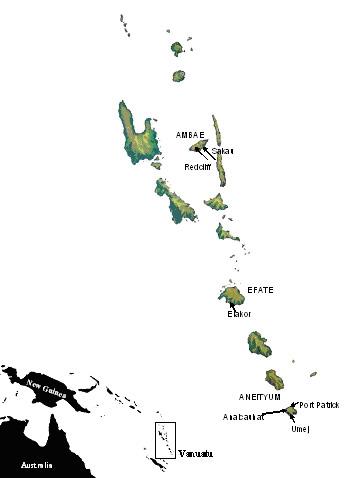Vanuatu Health Transitions Project
The process of economic development leads to changes in myriad aspects of people’s lives—including diets, physical activity, education, communication, media consumption, ease of travel, and access to health care—that are likely to affect their health. Populations with higher levels of economic development have substantially higher rates of chronic diseases such as type 2 diabetes and cardiovascular disease, even as access to education and health care improve other aspects of their lives.
Economic development on the islands of the South Pacific nation of Vanuatu has led to rapid changes in subsistence patterns, contributing to increasing chronic disease risk. This change has led to dramatic differences across islands: some have urban centers, extensive infrastructure, and high levels of market integration, while others remain rural, with limited infrastructure, and low participation in markets.
Established in 2007 and directed by Professors Koji Lum and Ralph Garruto, the Vanuatu Health Transitions Project uses differences in economic development across islands to study the process in detail: How do the residents of these islands differ in risk for chronic diseases? What aspects of diets, physical activity, and health change earliest as economic development occurs? What changes come later? Are all health effects of economic development negative, and whose health suffers most? Why and how does development have the adverse impacts on health that it does?
Binghamton University Anthropology PhD program graduates Kathryn Olszowy and Kelsey Dancause , and faculty members Ralph Garruto, Koji Lum, and Katherine Wander are part of this multi-site, multi-institution collaborative project. We collect information about body composition and adiposity, inflammation, physiological and psychosocial stress, infectious diseases (such as malaria), and chronic diseases (such as diabetes) to test hypotheses about the processes of economic development and its impact on the lives of Vanuatu residents. We work jointly with the Ministry of Health and the Vanuatu National Cultural Council to identify cultural traits that are associated with good health, and that could form a foundation for the creation of educational programs that can be enacted and promoted at a local level.

Figure: Map of Vanuatu showing its location relative to New Guinea and Australia.